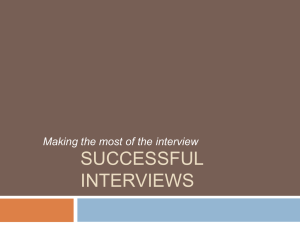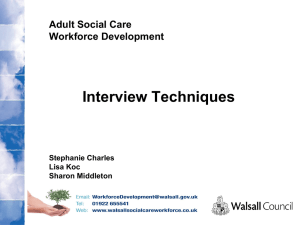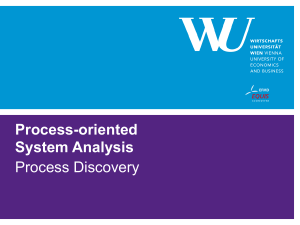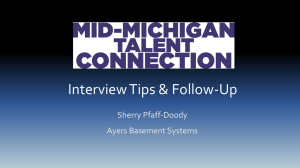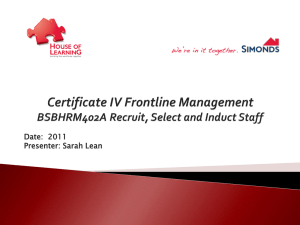Why do universities interview?
advertisement
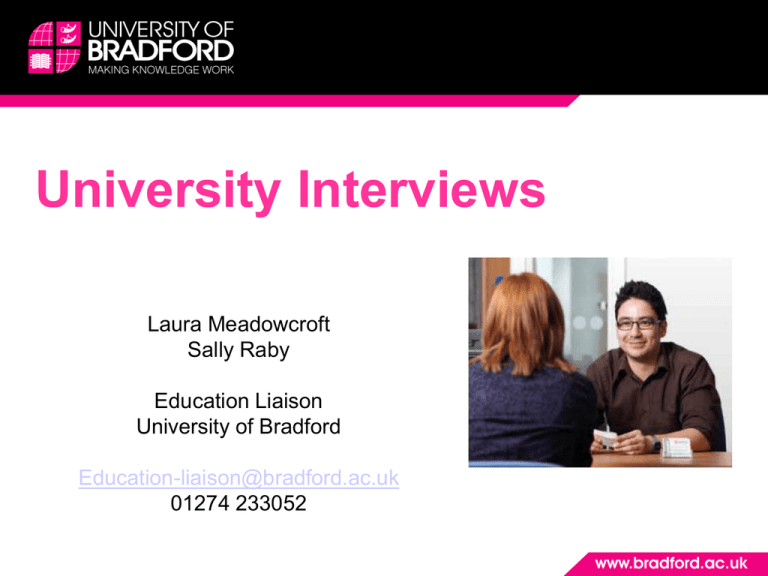
University Interviews Laura Meadowcroft Sally Raby Education Liaison University of Bradford Education-liaison@bradford.ac.uk 01274 233052 University Interviews • • • • • • Why do universities interview? Types of interview Courses that interview at Bradford What are we looking for – some examples Preparing students for interview Interview Tips Why do universities interview? • Requirement of external body (e.g. Nursing and Midwifery Council) • More applicants than places • Vocational or practical courses • Build on Personal Statement • Opportunity to find out more about institution and ask questions Types of interview • • • • • One-to-one Panel (2 or more interviewers) Presentation Activity/test (e.g. language/numeracy) Group Group Interviews • Why do universities choose group interviews? – See how you perform and communicate with others – Encourages interviewees to relax – Less time consuming Group Interviews • What format do group interviews take? – Varies widely • • • • • • Initial welcome/presentation Icebreaker Group discussion/activity Feedback Numeracy and literacy test Q&A Contributing- Group Interviews • • • • • • Be polite and friendly to other candidates Make an active contribution to discussions Avoid dominating the conversation Do not interrupt other candidates Avoid heated conflict Give praise where appropriate Courses that Interview School of Health • All undergraduate courses that incorporate a professional qualification School of Life Sciences • Clinical Sciences • Optometry • Pharmacy • Biomedical Science School of Social and International Studies • Social Work Courses that interview School of Engineering, Design and Technology • Product Design and & Automotive Design School of Computing, Informatics and Media • Media Courses • Creative Technology courses Clinical Sciences – interview structure • We interview for both points of entry • All applications are assessed against both academic and non-academic criteria. Applicants who score above our threshold are invited for interview • To date we have done a structured individual interview – each candidate is interviewed for 25 minutes by 2 members of academic staff. • We haven’t used any kind of performative or group task in interviews so far – but this may change. Clinical Sciences – what are we looking for? • Motivation and insight into the course and medicine/health professions (including reflection on what a candidate has gained from work experience etc) • Social and Cultural awareness – and the impact on health /barriers to accessing healthcare etc • Responsibility • Teamwork • Communication skills • Commitment • Academic potential Optometry – structure and what we are looking for. Students are interviewed as part of an Applicant Visit Day Structure of the day: • 45 minute lecture • Group interview – 45 minutes, 1 academic and 4 applicants • Tour of the department • Opportunity to talk to 2nd year and final year students • Accommodation Tour • Lunch attended by academics • Group interview consists of 1 academic and four applicants. They are assessing the student’s personality to see if they can communicate and will make an effective Optometrist. They also like students to have completed work experience and to be able to demonstrate that they understand the role. Social Work - Interview Structure • Observed group exercise - Short film clip,20 minutes to discuss issues it raises • Written Exercise – comprehensible written English • Interview – 7 questions, 2 interviewers – Academic and Practitioner Social Work – What are we looking for? •Students who have some capacity to cope with stressful situations and have the potential to respond appropriately •Students who have a good understanding of the roles of social workers and the skills and knowledge they use •Students who have an ability to analyse their experience •Have potential to develop into a reflective practitioner •Students who are open to exploring their own values •Have potential to develop an active commitment to social work values. Preparing students for interviews • • • • Find out interview format Confirm attendance Plan their journey Highlight the importance of dressing appropriately • Research the University and course • Read up on current affairs/issues Preparing students for interviews • Read up on current affairs/issues • Importance of re-reading their Personal Statement • How to prepare answers to key questions • Encourage them to think of examples of their skills, qualities and experiences Preparing students for interviews • Arrive in plenty of time • Report to specified location 10-20 minutes before your interview time • Take along any documents requested • Be polite to everyone you meet • Smile! The interview - effect of communication • Non verbal signals/ body language 55% • Tone of Voice 37% • Message content (words used) 8% During the interview • Listen carefully to and take time to think • Ask for clarification if necessary • Watch your body language and maintain eye contact • Avoid distracting mannerisms • Speak clearly and firmly – no waffling • Be positive about problem areas Non-Verbal Communication: • • • • • • Clothes/ appearance Eye Contact Facial Expression Posture Gestures SMILE! How you say things Show you are listening Speak slowly and clearly Smile! Avoid distracting mannerism; don’t fidget or play with your hair… When answering… • • • • • • Highlights strengths Minimise weakness Be enthusiastic and positive Give specific examples to back up answers Give themselves time to answer Keep in mind that interviewers will know answers to some questions that they ask – but assume that they do not! Some traditional questions • • • • • • • • • Tell me about yourself. Why did you apply for the course? What are your strengths / weaknesses? What is your greatest achievement(s) to date? How do you motivate yourself? Why do you choose (your course) and why the University of Bradford? What do you enjoy most about your studies? What did you least enjoy? Describe how you typically approach a project How would your tutor describe your work Thank you for listening Any Questions?

